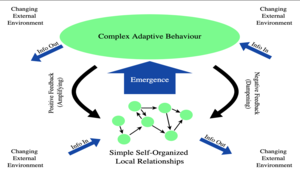Complex Adaptive Systems

“Complex Adaptive Systems“
Author | Editor: Lawson, S. (University of Utah); Canna, S. (NSI, Inc.)
Executive Summary
In his interview with Lt Col David Lyle (US Air Force Academy) on 4 June 2019, Dr. Sean Lawson discusses how complexity might inform SMA’s Future of Global Competition & Conflict study. More specifically, Dr. Lawson argues that although it is important to look back at previous instances of the butterfly effect, butterfly effects are not possible to control because they are merely byproducts of a system’s existence. An inability to control certain butterfly effects, however, does not diminish the importance of expecting and planning for them, as well as developing the ability to react and adapt to changing circumstances. Dr. Lawson also speaks about the OODA Loop (observe, orient, decide, act), highlighting that US decision makers should not abandon it, but they should rethink its application and the way in which they study it. He also warns decision makers that they must maintain their trust in experts in order to avoid a potential negative feedback loop in the midst of an increasingly chaotic world. The interview continues with a discussion about potential factors that could cause a phase change in the current political and economic world order. Dr. Lawson argues that migration and climate change are the two factors that could most likely instigate this change. Dr. Lawson continues by explaining that the stability of the US’s own system is currently in flux, and it is difficult to say whether it can count on its own foundations as the bases of its stability anymore.
Download Publication
Comments